Scientific Publications of the Cologne Institute for Economic Research: IW-Trends, IW policy papers, IW-Analysen, IW-Studien, IW-Reports, IW-Kurzberichte and Expertises. Read more about our Approach to Research.
- Home
- Studies
Studies
- Anger, Christina
- Bach, Helena
- Bakalis, Dennis
- Bardt, Hubertus
- Bergmann, Knut
- Beznoska, Martin
- Burstedde, Alexander
- Busch, Berthold
- Bähr, Cornelius
- Büchel, Jan
- Decker, Mareike
- Demary, Markus
- Demary, Vera
- Deschermeier, Philipp
- Diermeier, Matthias
- Engels, Barbara
- Engler, Jan Felix
- Enste, Dominik H.
- Ewald, Johannes
- Flake, Regina
- Fremerey, Melinda
- Geis-Thöne, Wido
- Gerards Iglesias, Simon
- Goecke, Henry
- Grömling, Michael
- Haag, Maike
- Hammermann, Andrea
- Henger, Ralph
- Hentze, Tobias
- Hünnemeyer, Vanessa Rebecca
- Hüther, Michael
- Jansen, Anika
- Kauder, Björn
- Kempermann, Hanno
- Kestermann, Christian
- Kirchhoff, Jasmina
- Kohlisch, Enno
- Kolev-Schaefer, Galina
- Koppel, Oliver
- Kremers, Corinna
- Kroke, Thorsten
- Kunath, Gero
- Küper, Malte
- Lesch, Hagen
- Lichtenthäler, Sarah
- Malin, Lydia
- Matthes, Jürgen
- Mertens, Armin
- Neligan, Adriana
- Niehues, Judith
- Oberst, Christian
- Obst, Thomas
- Parthie, Sandra
- Pierenkemper, Sarah
- Pimpertz, Jochen
- Plünnecke, Axel
- Potthoff, Jennifer
- Puls, Thomas
- Risius, Paula
- Rusche, Christian
- Röhl, Klaus-Heiner
- Sagner, Pekka
- Schaefer, Thilo
- Scheufen, Marc
- Schmitz, Edgar
- Schröder, Christoph
- Schäfer, Holger
- Schüler, Ruth Maria
- Seele, Stefanie
- Seyda, Susanne
- Stettes, Oliver
- Stockhausen, Maximilian
- Suling, Lena
- Sultan, Samina
- Taft, Niklas Florian
- Tiedemann, Jurek
- Vahlhaus, Isabel
- Vogel, Sandra
- Voigtländer, Michael
- Wendt, Jan
- Werner, Dirk
- Wildner, Julia
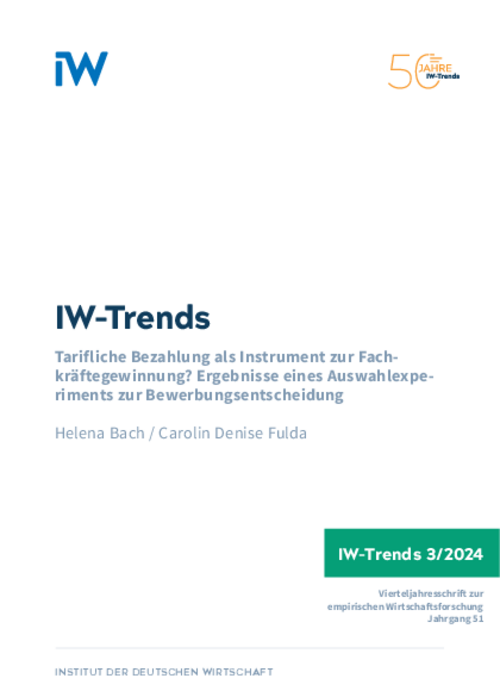
Collectively Agreed Wages as an Instrument for Recruiting Skilled Labour?
Companies are increasingly focussing their attention on the recruitment of skilled workers and thus facing the growing challenge of making their job advertisements as attractive as possible.
Helena Bach / Carolin Denise Fulda IW
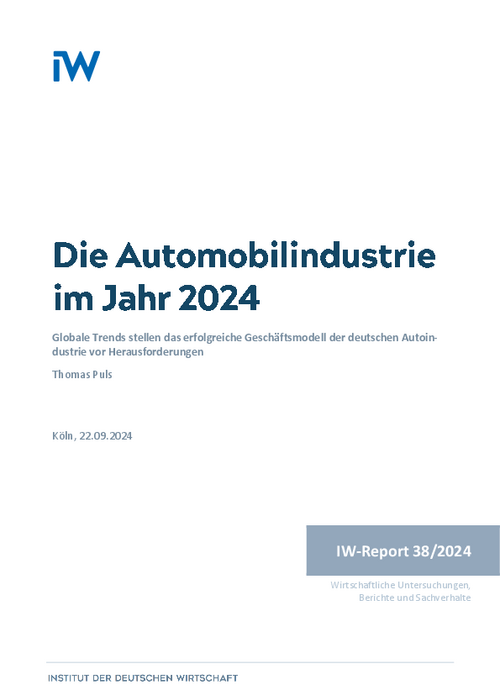
The automotive industry in 2024
Since the turn of the millennium, the epicenter of the global automotive industry has shifted to Asia. Virtually all growth has taken place in Asia and China in particular. In 2023, almost 60 percent of all motor vehicles were built in Asia and almost 50 percent were sold there.
Thomas Puls IW
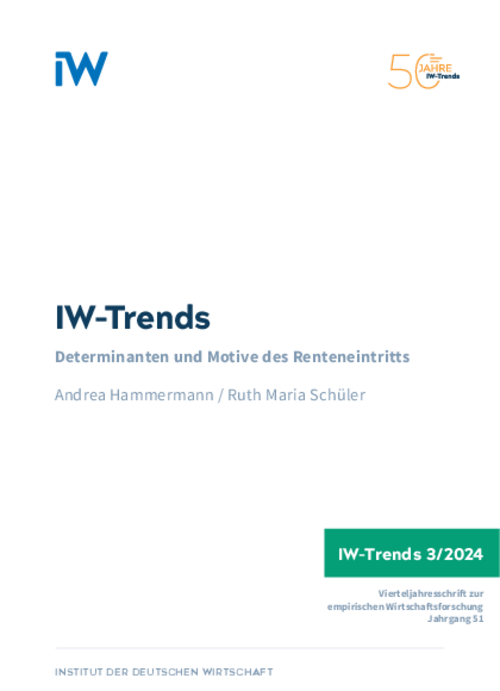
How Germans Decide when to Retire
As German life expectancy has increased over recent decades, the number of years retirees draw a pension has also risen significantly.
Andrea Hammermann / Ruth Maria Schüler IW
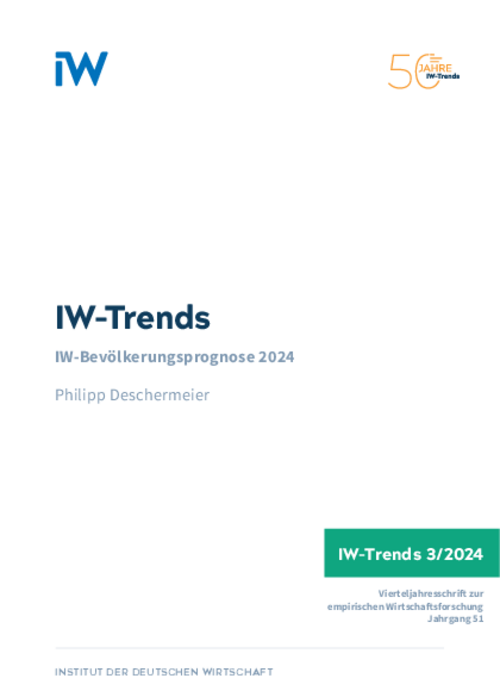
IW Population Forecast 2024
The demographic transition poses major challenges for policymakers, business and society as a whole. Policymakers seeking solutions to these challenges mainly base their decisions on the quantitative data of population forecasts.
Philipp Deschermeier IW
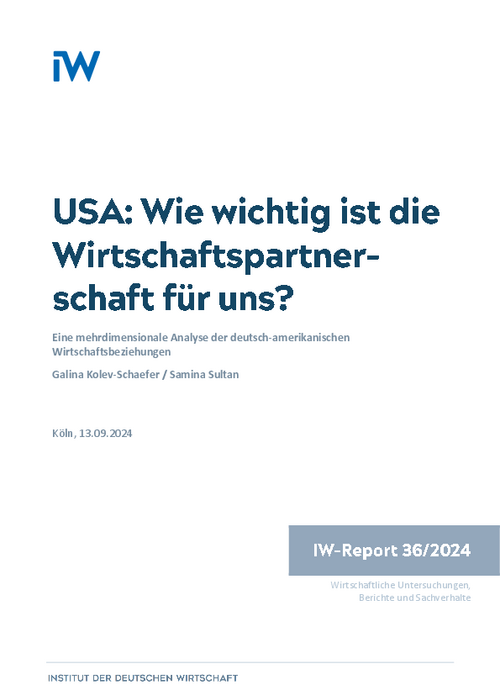
USA: How important is the economic partnership for us?
Despite the persistent protectionist course of US trade policy in recent years and China's rise as a global economic power, the German and US economies remain closely intertwined.
Galina Kolev-Schaefer / Samina Sultan IW
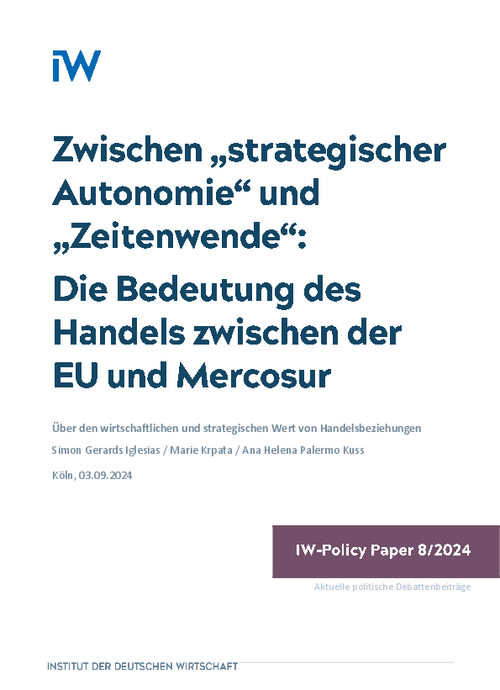
Between „strategic autonomy” and „turning point”: The importance of trade between the EU and Mercosur
This policy paper analyses the geopolitical and economic significance of the EU-Mercosur agreement for the European Union (EU) in the context of the EU's new European Economic Security Strategy.
Simon Gerards Iglesias / Marie Krpata* / Ana Helena Palermo Kuss* IW
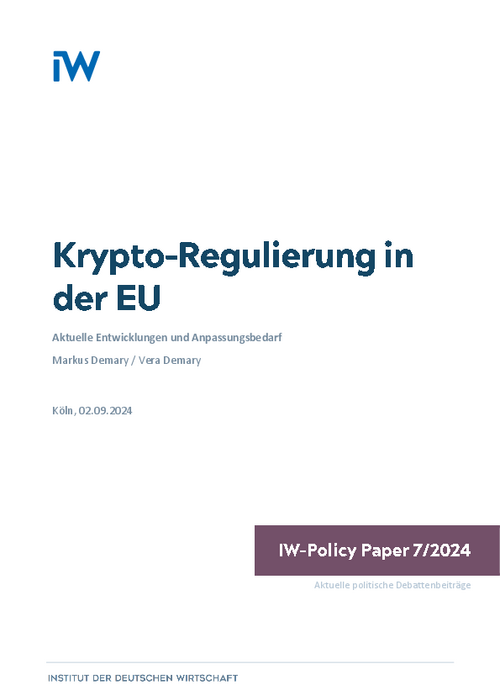
Crypto regulation in the EU
FC Bayern Munich footballers advertise for the crypto exchange Bitpanda, Crypto.com advertised with rapper Eminem during the NBA playoffs of the Los Angeles Lakers basketball team, whose arena was renamed “Crypto.com Arena” in 2021.
Markus Demary / Vera Demary IW
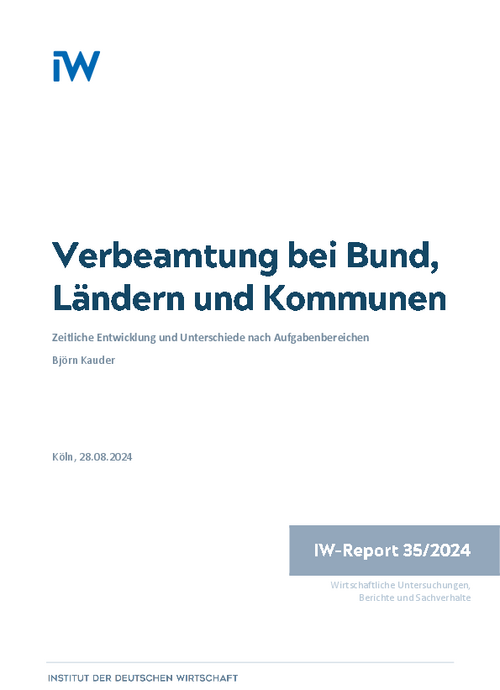
Civil service at federal, states and municipalities
In recent years, the federal, state and local governments have significantly increased their staffing levels. Nevertheless, many places are complaining about a shortage of staff, partly because increasing regulation is putting a strain on public sector staff.
Björn Kauder IW
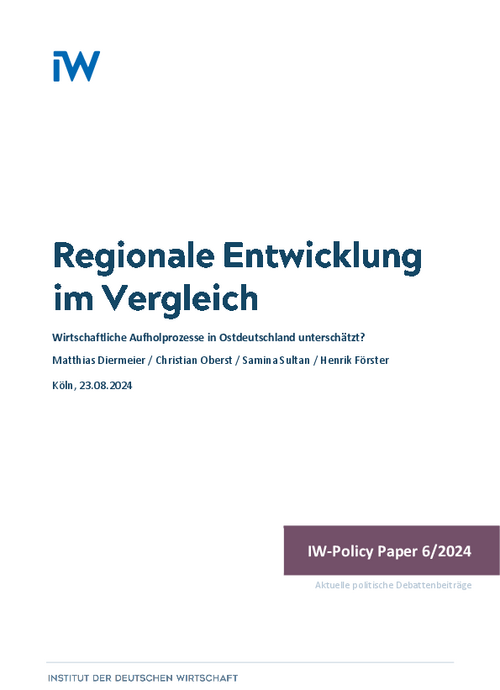
A comparison of regional development
Over the past ten years, a clear economic catch-up process can be observed in East Germany in comparison with West Germany.
Matthias Diermeier / Christian Oberst / Samina Sultan / Henrik Förster IW
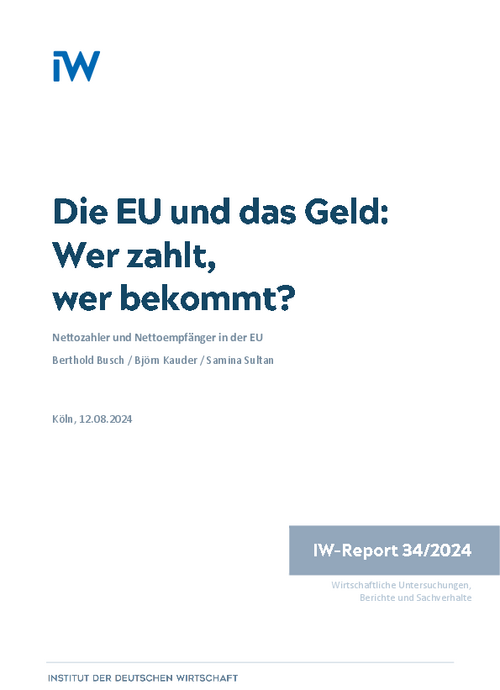
The EU and money: Who pays, who gets?
The German net position fell slightly in 2023 compared to the previous year, from 19.7 billion euros to 17.4 billion euros. However, it is still significantly higher than in the pre-Brexit period.
Berthold Busch / Björn Kauder / Samina Sultan IW
Your search returned an incorrect status. You may have selected too many filters. You can jump back to your previous selection to adjust your search.
Understanding Science
- The scientific work of the German Economic Institute is independent and solution-oriented, internationally networked and socially relevant, methodologically open and interdisciplinary. We address the scientific discourse of experts, the general public as well as opinion leaders in politics, business and society. We want to be an audible voice in the economic policy discourse in Germany.
- Our work is innovative and confronts the scientific discourse: On the basis of scientifically recognized standards, we apply new methods, use new data sets, discuss new arguments and provide solution-oriented answers to current questions in economic analysis and economic policy. Our statements are theoretically founded and, where it is methodologically and empirically possible, evidence-based. We ensure that both the data basis and the methodological approaches are comprehensible. Modern methods of empirical economic and social research are as much a part of our tools as in-depth analyses of the institutional and political-economic conditions of economic developments.
- We do not exclude any theoretical and methodological approach, because diversity and competition promote progress in the sciences. The decisive factor is not a traditional paradigm, but whether and how a scientific approach leads further in the search for decision-guiding and action-relevant knowledge. Our research is not limited to economics, but is connectable to the debates and insights of other disciplines, such as ethics, history, education, political science, psychology, law, and sociology.
- Our research is aware of its normative conditionality. Every science of human social action requires a normative clarification of the concept of man. Freedom and (co-)responsibility are the central values for us. We see the human being as a being capable of freedom and responsibility, who in this sense is enabled and called upon to competent decisions and actions. In our view, open, liberal and democratic societies require a liberal and competitive economic order that counts personal responsibility and shared responsibility among its constitutive elements.
Subscribe to our monthly newsletters to receive updates on the latest IW publications.
Each issue is dedicated to specific economic topics.
Sign up here to stay informed.
Subscribe to our monthly newsletters to receive updates on the latest IW publications.